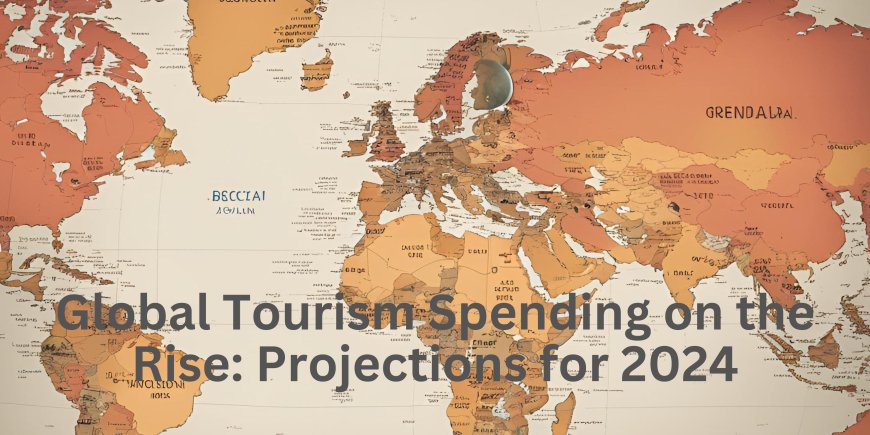Global Tourism Spending on the Rise: Projections for 2024
Euromonitor International projects global tourism spending to reach USD 2 trillion in 2024, fueled by emerging markets and unique travel experiences, despite challenges such as geopolitical instability and sustainability issues.

According to a recent report by Euromonitor International, global tourism spending is projected to reach an unprecedented USD 2 trillion in 2024. This significant growth is driven by a surge in demand from emerging markets and a sustained interest in unique and personalized travel experiences. However, the sector also faces considerable challenges, including geopolitical instability and sustainability issues, which could impact the trajectory of this growth.
Surge in Demand from Emerging Markets
One of the key drivers behind the projected increase in global tourism spending is the rising demand from emerging markets. Countries such as China, India, and Brazil are seeing a rapid expansion in their middle-class populations, leading to an increase in disposable incomes and a greater propensity to spend on travel. This trend is not just limited to international travel; domestic tourism within these countries is also on the rise, contributing to overall spending.
China, in particular, has become a major player in the global travel market. According to data from the China Tourism Academy, Chinese tourists made 155 million outbound trips in 2019, and this number is expected to grow as travel restrictions ease and the economy continues to recover from the COVID-19 pandemic. The desire to explore new destinations and experience different cultures is driving this surge, with Chinese travelers showing a strong preference for high-end, unique experiences.
Sustained Interest in Unique Travel Experiences
In addition to the growing demand from emerging markets, there is a sustained interest in unique and personalized travel experiences among global travelers. Today's tourists are increasingly seeking out experiences that offer more than just relaxation. They are looking for activities that allow them to engage with local cultures, learn new skills, and create memorable moments.
This shift in consumer preferences has led to a boom in niche travel markets such as adventure tourism, wellness tourism, and eco-tourism. Adventure tourism, for instance, is attracting travelers who want to engage in activities like hiking, scuba diving, and wildlife safaris. Wellness tourism, on the other hand, appeals to those looking to improve their health and well-being through activities such as yoga retreats, spa treatments, and meditation workshops.
Eco-tourism is also gaining popularity as travelers become more environmentally conscious. This form of tourism emphasizes sustainable travel practices and aims to minimize the negative impact on the environment while promoting conservation efforts. Destinations that offer eco-friendly accommodations, wildlife conservation programs, and opportunities to engage with local communities are particularly attractive to this segment of travelers.
The Role of Technology in Shaping Travel
Technology continues to play a pivotal role in shaping the travel industry. From booking platforms and mobile apps to virtual reality (VR) and artificial intelligence (AI), technological advancements are enhancing the travel experience and making it more accessible to a wider audience.
Online travel agencies (OTAs) and booking platforms have simplified the process of planning and booking trips, allowing travelers to compare prices, read reviews, and make reservations with ease. Mobile apps provide travelers with real-time information on flight statuses, weather conditions, and local attractions, making it easier to navigate new destinations.
Moreover, VR technology is offering travelers the opportunity to explore destinations virtually before committing to a trip. This can help them make more informed decisions and tailor their itineraries to suit their interests. AI, meanwhile, is being used to provide personalized recommendations, optimize travel itineraries, and enhance customer service through chatbots and virtual assistants.
Challenges: Geopolitical Instability
Despite the positive outlook for global tourism spending, the industry faces significant challenges that could impact its growth. One of the major concerns is geopolitical instability. Political tensions, conflicts, and security threats can deter travelers from visiting certain destinations and disrupt travel plans.
For example, regions experiencing political unrest or military conflicts often see a decline in tourist arrivals due to safety concerns. Travel advisories and restrictions issued by governments can also impact travel patterns. Additionally, diplomatic disputes between countries can lead to travel bans or restrictions, further affecting the flow of tourists.
To mitigate these risks, the travel industry must stay informed about geopolitical developments and be prepared to adapt to changing circumstances. This may involve diversifying travel offerings, enhancing security measures, and providing travelers with up-to-date information on safety conditions.
Challenges: Sustainability Issues
Sustainability is another critical challenge facing the travel industry. As tourism continues to grow, its impact on the environment and local communities becomes increasingly significant. Over-tourism, pollution, and the depletion of natural resources are some of the issues that need to be addressed to ensure the long-term viability of the industry.
The concept of sustainable tourism emphasizes the need to balance economic growth with environmental protection and social responsibility. This involves promoting responsible travel practices, supporting local economies, and preserving cultural heritage. Destinations that prioritize sustainability are likely to attract environmentally conscious travelers and gain a competitive edge in the market.
Travel companies and destinations can adopt various sustainability initiatives to reduce their environmental footprint. These may include implementing waste reduction programs, using renewable energy sources, supporting conservation projects, and promoting eco-friendly accommodations. Engaging travelers in sustainability efforts through education and awareness campaigns is also essential to foster a culture of responsible tourism.
Looking Ahead: Opportunities for Growth
Despite the challenges, the future of global tourism looks promising, with numerous opportunities for growth. The increasing demand from emerging markets, coupled with the sustained interest in unique travel experiences, provides a solid foundation for the industry's expansion.
To capitalize on these opportunities, travel companies and destinations must stay attuned to changing consumer preferences and market trends. This involves continuously innovating and enhancing their offerings to meet the evolving needs of travelers. Personalization, authenticity, and sustainability are key factors that will drive success in the competitive travel market.
Moreover, collaboration among industry stakeholders, including governments, travel companies, and local communities, is crucial to address challenges and promote sustainable growth. By working together, they can create a resilient and inclusive travel ecosystem that benefits both travelers and destinations.
Conclusion
Euromonitor International's projection of global tourism spending reaching USD 2 trillion in 2024 is a testament to the resilience and dynamism of the travel industry. The surge in demand from emerging markets and the sustained interest in unique travel experiences are driving this growth, despite the challenges posed by geopolitical instability and sustainability issues.
As the industry navigates these challenges, it must embrace innovation, prioritize sustainability, and foster collaboration to ensure long-term success. By doing so, the travel industry can continue to thrive and provide enriching experiences for travelers around the world.
For more information and detailed insights, visit Euromonitor International.
Sources:
- Euromonitor International - Global Tourism Spending Report
- World Travel & Tourism Council - Economic Impact Reports
- China Tourism Academy - Outbound Travel Trends
- Adventure Travel Trade Association - Adventure Tourism Market Study
- Global Wellness Institute - Wellness Tourism Statistics
- Sustainable Travel International - Eco-tourism Initiatives

 LD Web Desk
LD Web Desk 